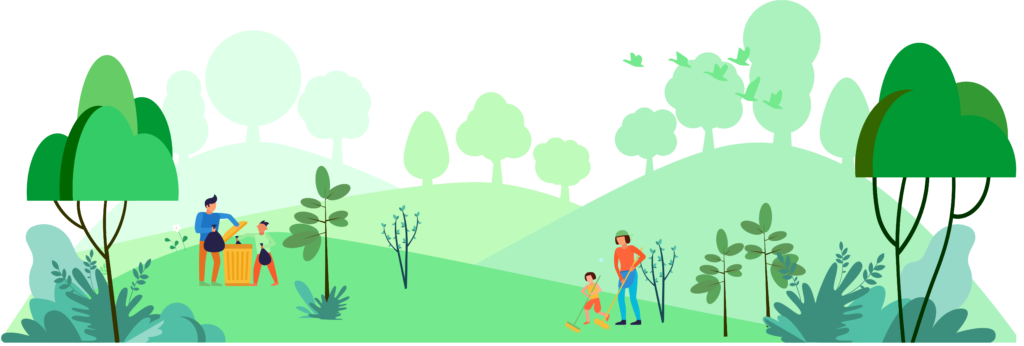
Frequently
ASKED QUESTIONS
The ASEAN Green Initiative FAQs
We’re scaling up the region’s commitment to biodiversity conservation and ecosystem restoration with the launch of the ASEAN Green Initiative.
The initiative brings together different stakeholders to participate in an ambitious goal of planting at least 10 million native trees over a period of 10 years through a recognition scheme where the best ecosystem restoration activities and programmes that not only regrow our forests but contribute to peoples’ well-being, livelihood improvement, and resilience-building will be recognised.
The ASEAN Centre for Biodiversity serves as the secretariat of the ASEAN Green Initiative.
In order for us to fulfill our commitment to plant at least 10 million native trees in a span of a decade, we must ignite, support, and mobilise collective action towards biodiversity conservation and restoration of ecosystems. This commitment is no small feat, and every mindful action by everyone counts!
Across the ASEAN region, tree planting and reforestation activities abound. The ASEAN Green Initiative shall evaluate and recognise them based on their ecological soundness, socio economic impact, sustainability, and compliance with governance and institutional mechanisms. This is to ensure that the extraordinary work they’re doing in caring about our environment can serve as role models worthy to be replicated.
Restoration generally means bringing back something to its original form. This is especially true for the reforestation of ecosystems.
The ASEAN Green Initiative puts much emphasis and preference on planting native tree species because they are more likely to regenerate faster in their natural environment and are more sustainable in the long-term. Native trees are more suited to the climate and soil types, and hence they have a tendency to be more resilient and have a higher rate of survival. In the process, they preserve biodiversity and help revive the natural interactions between organisms and species of both flora and fauna.
The ASEAN Green Initiative promotes actions that are guided by science and informed decisions. All interventions in restoring and conserving the ecosystem should be appropriate and should not harm the natural environment. Indigenous species and biodiversity should be protected.
Small, medium, and large-scale tree planting and reforestation may be nominated to the ASEAN Green Initiative. Some examples are reforesting deforested areas; enrichment planting of degraded forest areas, coastal and mangrove habitats; and urban tree planting, which includes planting in parks and along streets.
The ASEAN Green Initiative puts high preference on the planting of indigenous tree species or those native to a particular area or region.
Tree planting for plantations meant for commercial timber production does not qualify for the ASEAN Green Initiative.
Know more about the ASEAN Green Initiative Nomination Guidelines
This decade could possibly be our last chance to restore our ecosystem, eliminate hunger, improve health, and save lives. The UN Decade on Ecosystem Restoration is a distress call to bring the world’s attention to act on urgent need to prevent, halt, and reverse the degradation of ecosystems worldwide to ‘end poverty, combat climate change, and eliminate mass extinction.’
The ASEAN Green Initiative is a solid and grounded response to this call. While ecosystem restoration and biodiversity conservation are ongoing priorities in the ASEAN region, there is no better time to scale our efforts up than now. Monitoring, recognising, and gearing up the effectiveness of our conservation outcomes are critical in this decade to ensure that future generations of ASEAN citizens can enjoy the richness of our region’s biodiversity and live healthier, safer, and happier lives.
Any individual, community organisation, institution, professional body, or similar group can nominate, as long as the initiative is in any ASEAN Member State (Brunei Darussalam, Cambodia, Indonesia, Lao PDR, Malaysia, Philippines, Singapore, Thailand, Viet Nam)
The AGI recognition may provide opportunities, such as expansion of network, funding prospects, enhancement of corporate image, reduction of environmental impact, participation in regional biodiversity dialogues and events, and the potential increase in revenue. And of course, it’s the right thing to do. Restoring ecosystems is both important and urgent, and the AGI is a worthwhile endeavour––a perfect opportunity for everyone to be a part of the ASEAN community.
Any nomination that registers its tree planting activity for inclusion in AGI, submits the required documentary requirements, and meets the criteria, may be qualified to be recognised and receive an AGI Certificate.
To encourage greater engagement and participation in tree planting initiatives, no minimum number of trees is required for nomination. Tree planting initiatives can be nominated for any of the following categories:
Small-scale initiative – up to 100 trees planted
Medium-scale initiative – 101 up to 5,000 trees planted
Large-scale initiative – over 5,000 trees planted
As biodiversity is everyone’s concern, your actions now can help ensure the sustainability of the web of life for the current and future generations. Here are ways you can support the programme as a partner:
1. Partner with the ACB and support our strategic programmes and initiatives
2. Share your expertise and be part of the ACB’s pool of biodiversity experts and advocates
3. Spread awareness about biodiversity among your networks
Know more about how to be involved by sending us an email at agi@aseanbiodiversity.org
Yes. Aside from being a partner, here are some other ways you can show support to the ASEAN Green Initiative.
- BE INVOLVED in tree planting activities. Support and initiate tree planting and reforestation activities in your community or organisation
- NOMINATE outstanding tree planting activities. Keep in mind that all nominations will be evaluated based on a clear set of criteria and will undergo a rigorous selection process.
- BE AN ADVOCATE. Add your voice in raising awareness about ecosystem restoration and biodiversity conservation by following the ASEAN Centre for Biodiversity Facebook, Twitter, and Instagram accounts and sharing useful information to your networks. We encourage you to use the following hashtags to reach more people: #ASEANGreenInitiative #GenerationRestoration #OneASEAN #OneBiodiversity
